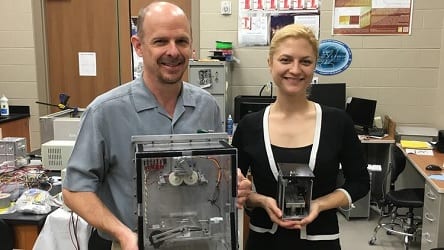Space Dust Research Wins NASA Rides
By Scott Powers – Writer for Orlando Sentinel
Tiny particles of space dust: How do they stick together? How might astronauts not stir them up? Two UCF scientists are asking, and they’ve gotten NASA’s attention.
UCF physics Professor and Assistant Director at the Florida Space Institute Joshua Colwell, Ph.D., and UCF physics post-doctoral Research Scientist Julie Brisset, Ph.D., have won two of nine new NASA grants awarded this week. The grants will allow them to send eight experiments up on sub-orbital flights. In their separate experiments, Brisset and Colwell will be researching what happens to dust particles in micro-gravity. Brisset will be looking for clues to the past, while Colwell will be looking to develop advice for NASA missions in the future.
Brisset is studying how tiny particles might stick together – critical to understanding how the planets formed billions of years ago. NASA is arranging for her next experiment to go up in a small sub-orbital rocket next August, and is supporting her work with $92,000.
Colwell is studying how to touch something blanketed with coarse space dust called regolith, without stirring up too much. That is critical to understanding how NASA astronauts or robots might visit asteroids in the future. NASA is arranging for his next experiment to go up in an airplane, that creates micro-gravity by flying parabolic aerobatics, in August of next year and is supporting his work with about $140,000.
NASA announced those two awards, through its Flight Opportunities Program, plus the other 7 awards that went to researchers in Wisconsin, California, New York, Virginia and elsewhere on November 19th.
To read the original article in the Orlando Sentinel click here.

